|
|
| |
|
| |

Hexagon
Series on
Human, Environmental Security and Peace (HESP)
Edited by
Hans Günter Brauch,
AFES-PRESS, chairman
Free University of Berlin (Ret.)
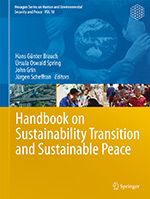 |
HEXAGON
Series
Vol 10
|
Hans Günter Brauch, Úrsula Oswald Spring, John Grin, Jürgen Scheffran (Eds.): Handbook on Sustainability Transition and Sustainable Peace. Hexagon Series on Human and Environmental Security and Peace 10 (Heidelberg – New York – Dordrecht – London: Springer-Verlag, 2016).
ISBN: 978-3-319-43882-5 (Print)
ISBN: 978-3-319-43884-9 (Online)
DOI 10.1007/978-3-319-43884-9
Order this book on Springer Website
Electronic Version of book and individual chapters
Product Flyer
Book Presentations and Press Conferences |
Contents
On the Editors
On Authors of Forewords
On the Authors
Book launches
Book Announcements
Book Reviews
|
|
|
In this book 60 authors from many disciplines and from 18 countries on five continents examine in ten parts: Moving towards Sustainability Transition; Aiming at Sustainable Peace; Meeting Challenges of the 21st Century: Demographic Imbalances, Temperature Rise and the Climate–Conflict Nexus; Initiating Research on Global Environmental Change, Limits to Growth, Decoupling of Growth and Resource Needs; Developing Theoretical Approaches on Sustainability and Transitions; Analysing National Debates on Sustainability in North America; Preparing Transitions towards a Sustainable Economy and Society, Production and Consumption and Urbanization; Examining Sustainability Transitions in the Water, Food and Health Sectors from Latin American and European Perspectives; Preparing Sustainability Transitions in the Energy Sector; and Relying on Transnational, International, Regional and National Governance for Strategies and Policies Towards Sustainability Transition.
This book is based on workshops held in Mexico (2012) and in the US (2013), on a winter school at Chulalongkorn University, Thailand (2013), and on commissioned chapters. The workshop in Mexico and the publication were supported by two grants by the German Foundation for Peace Research (DSF). All texts in this book were peer-reviewed by scholars from all parts of the world. . |
| |
|
|
|
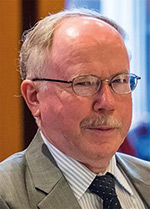 |
Hans Günter Brauch, Adj. Prof. (PD), Free University of Berlin (ret.); chairman of Peace Research and European Security Studies (AFES-PRESS); editor of five English language book series published by SpringerNature; works on peace, security and environment.
Biography
Download page
Address
Wikipedia
|
| |
|
|
Úrsula Oswald Spring, Research Professor, Center for Regional Multidisciplinary Research at the National Autonomous University of Mexico (CRIM–UNAM); former Minister of Ecological Development in the state of Morelos and lead author of the IPCC.
Biography
Download page
Address |
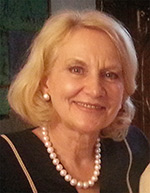 |
| |
|
|
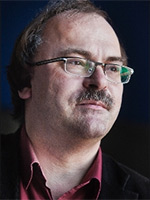 |
John Grin, Professor of Policy Science, Department of Political Science, University of Amsterdam; Co-Director (with M. Glasius) of the Programme Group Transnational Configura-tions, Conflicts and Governance, Amsterdam Institute for Social Science Research (AISSR).
Biography
Webpage
Address |
| |
|
|
Jürgen Scheffran, Professor, Institute of Geography and Center for Earth System Research and Sustainability (CEN), University of Hamburg, Germany; head of the Re¬search Group Climate Change and Security (CLISEC) in the CliSAP Cluster of Excellence.
Biography
Webpage CLISEC and Institute for Geography
Address
Wikipedia |
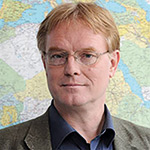 |
| |
|
|
|
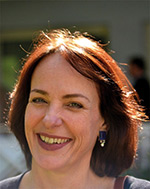 |
Solutions-oriented science that is global, inter- and transdisciplinary in nature is increasingly supported at the international level, most notably perhaps by initiatives such as Future Earth, a global platform for sustainability research established and now governed by an alliance of international organizations including ICSU and the ISSC. This volume on Sustainability Transition and Sustainable Peace shares the Future Earth vision. It makes a timely and important contribution to our understanding of the leading role that science can—and must—play in shaping humanity’s future on planet Earth.
Heide Hackmann, Executive Director, International Council for Science (ICSU) . |
| |
|
|
By linking the four social science research areas of peace studies, security studies, development studies and environmental studies, the Handbook makes a welcome contribution to an integrated assessment of these issues. As the IPCC focuses increasingly on solutions in future assessments we too will look increasingly at these areas. In its assessments of the policy response to climate change as well as the causes and impacts, the IPCC aims to be policy-relevant but never policy-prescriptive. But even in a policy-neutral framework, there is a need for a comprehensive, integrated and urgent response. This Handbook provides rich source of insights and information to students and policymakers as they confront these challenges.
Hoesung Lee, Chairman, Intergovernmental Panel on Climate Change (IPCC) |
 |
| |
|
|
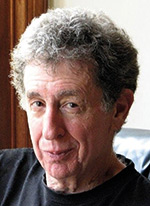 |
The critical uncertainty is whether the forces for a Great Transition will mobilize with sufficient speed, scale, and coherence. This question of social agency—Who will change the world?—needs a plausible answer. The myopic concerns of government and business render them poor candidates to lead the way. Civil society holds more potential. Indeed, in recent decades, countless global and local movements and organizations have weighed in on a full spectrum of issues, an eruption of citizen energy that has spread popular awareness, conducted important research, and mounted action campaigns. Much has been achieved, but piecemeal victories have not scaled up to a systemic change of direction. Organizational and conceptual fragmentation has stifled civil society’s potential, slicing the integral challenge into a thousand arenas and turfs with no unifying conceptual framework or social vision.
Our pressing task now is to weave disparate efforts into an integrated planetary praxis that can attract and engage widening circles of concerned citizens. Such a ‘global citizens movement’ is the critical actor for a Great Transition, but remains missing from the global stage. Nevertheless, history shows that popular movements arising from widespread grievance and offering a path to rectification can, after a period of slow development, reach a critical mass, then quickly coalesce. Thus, advancing an inclusive and plural global movement towards its tipping point has become a frontline project for shaping a civilization worthy of the name. In times of social stability, visionaries of a better world can be dismissed, with some justification, as quixotic dreamers. In transformative moments, business-as-usual thinkers are the utopians, and the prophets of ‘another world’ the pragmatists. If today’s generations prove too hidebound to accept the necessity of deep change or too cynical to think such change possible, the legacy could well be a century of decline. Hence, it is urgent but not too late to join together in a new planetary praxis for meeting the larger challenge: building the community of Earth.
Paul Raskin, President Tellus Institute |
| |
|
|
On the Authors
- Ms. Sophie Adams (Australia)
- Prof. Dr. Monica de Andrade (Brazil)
- Prof. Dr. Lourdes Arizpe (Mexico)
- Dr. Karoline Augenstein (Germany)
- Prof. Dr. Xuemei Bai (Australia/China)
- Dr. Lucy Baker (United Kingdom)
- Ms. Larissa Basso (Brazil)
- PD Dr. Hans Günter Brauch (Germany)
- Assoc. Prof. Dr. Hongmin Chen (China)
- Prof. Dr. Peter T. Coleman (USA)
- Prof. Dr. Simon Dalby (Canada/United Kingdom/Ireland)
- Prof. Dr. Morton Deutsch (USA)
- Prof. Dr. Eckart Ehlers (Germany)
- Ms. Rebecca Froese (Germany)
- Prof. Dr. Audley Genus (United Kingdom)
- Prof. Dr. John Grin (The Netherlands)
- Dr. Sander Happaerts (Belgium)
- Dr. Karlson ‘Charlie’ Hargroves (Australia)
- Dr. Mike Hodson (United Kingdom)
- Dr. Tobias Ide (Germany)
- Prof. Dr. Roeland J. in’t Veld (The Netherlands)
- Mr. Shivant Jhagroe (The Netherlands)
- Dr. Twig Johnson (USA)
- Prof. Dr. J. (Jan) Jonker (The Netherlands/France)
- Prof. Dr. René Kemp (The Netherlands)
- Dr. Martin Keulertz (Germany/USA)
- Ms. Claudia Köhler (Germany)
- Dr. Asfaw Kumssa (Sweden)
- Prof. Dr. Juan Antonio Le Clercq (Mexico)
|
- Dr. Peter Michael Link (Germany)
- Dr. Sylvia Lorek (Germany)
- Prof. Dr. Simon Marvin (United Kingdom)
- Assoc. Prof. Dr. Czeslaw Mesjasz (Poland)
- Dr. Carl Middleton (United Kingdom/Thailand)
- Prof. Dr. Linda O’Riordan (Germany/Ireland)
- Prof. Dr. Úrsula Oswald Spring (Mexico)
- Dr. Ilona Magdalena Otto (Germany)
- Dr. Bonno Pel (The Netherlands)
- Ms. Radhika Perrot (South Africa)
- Prof. Dr. Martin F. Price (United Kingdom)
- Dr. Britta Rennkamp (Germany/South Africa)
- Prof. Dr. Jürgen Scheffran (Germany)
- Dr. Philipp Schepelmann (Germany)
- Dr. Janpeter Schilling (Germany)
- Dr. Carl-Friedrich Schleussner (Germany)
- Prof. Dr. Uwe Schneidewind (Germany)
- Ms. Olivia Maria Serdeczny (Germany)
- Dr. Mandy Singer-Brodowski (Germany)
- Dr. Marit Sjøvaag (Norway)
- Dr. Philipp Späth (Germany)
- Carolyn M. Stephenson (USA)
- Prof. Dr. Mark Swilling (South Africa)
- Dr. Cecilia Tortajada (Mexico/Singapore)
- Ass, Dr. Gregory Trencher (USA)
- Prof. Dr. Eduardo Viola (Brazil)
- Sir Robert Worcester (United Kingdom)
- Prof. Dr. Belinda Yuen (Singapore)
- Dr. Hania Zlotnik (Mexico/US)
|
|
| |
Book Launches
| No. |
When |
Where |
Occasion |
Documentation |
| 1 |
9 September 2016 |
Wuppertal (Germany) |
IST Conference |
Wuppertal Institut |
Book Announcements
Book Reviews
|
| |
More on this book
|
Publisher's Corner
|
|
|
|